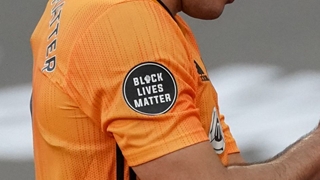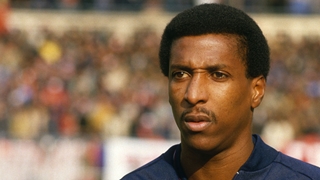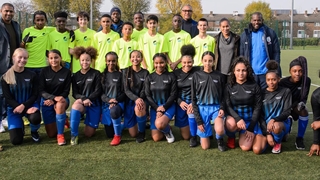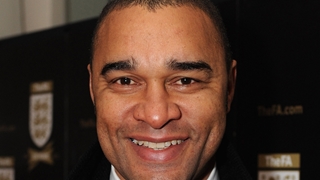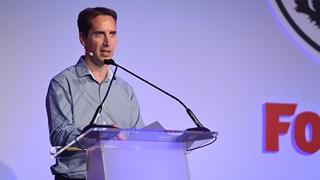
Black History Month offers us an opportunity to reflect on one of the most crucial societal issues of our time.
In recent months the important conversation around equality and diversity has risen in the public’s consciousness and has been discussed and felt across all areas of society. Many of us have been shocked, angered and dismayed by repeated incidents of racial injustice leading us to question how this can still be a reality in 2020.
Whilst the FA is an apolitical organisation, we have shown support for the Black Lives Matter message and share the belief that it is wholly unacceptable to treat Black people disadvantageously because of the colour of their skin.
For us, the message is simply about ensuring equal opportunities for all. Football’s collective response has been powerful, but the profound sense of social injustice we feel must – and will – be used as motivation to introduce meaningful and tangible change.
As guardians of the game, we have a responsibility to lead from the front, using the power of football to help drive positive change, both on and off the pitch. We are committed to making positive change happen.
In June, we announced the creation of the Football Leadership Diversity Code, led by Paul Elliott, which will launch during Black History Month. It will see clubs and organisations across the game commit to embedding greater diversity across their senior leadership teams, operations teams and coaching setups, with targets and transparent annual reports. We hope that changes in the composition of coaching and leadership teams will help introduce a systematic shift in our game.
I believe that this Code can have an indelible impact on football, making essential and positive changes to our game. But we cannot do it alone. We are asking clubs across the Premier League, EFL, National League System, Barclays FA Women’s Super League and FA Women’s Championship, as well as the leagues themselves, to join us.
What underpins this Code, and our other diversity and inclusion initiatives, is a genuine desire from many parts of football for meaningful change. Players, coaches, club officials and media have all contributed to the Code and we thank them for their input.
In recent years, we have prioritised improvements to tackling the issue of discrimination within English football, with tougher regulatory sanctions; inclusion programmes embedded across the country to help break down barriers and unite communities; education programmes for perpetrators; and we're always reviewing our internal processes to see where we can make further improvements.
We launched our three-year equality, diversity and inclusion plan – In Pursuit of Progress – in 2018, with clear targets and ambitions to drive meaningful change within our organisation and across the game. The plan delivers initiatives primarily focused around gender and ethnicity across our general workforce and leadership roles, to ensure that the diversity of those leading and governing football better reflects both the modern game and our wider society.
Today, the FA is more diverse than it has ever been and has the smallest gender pay gap of any major sporting governing body in England. The support structure of our England teams is also more reflective of our playing squads thanks to hugely successful initiatives such as the Elite Coach Placement Programme.
We have gender and ethnicity representation on our Board and on our senior management team. We recently appointed Edleen John as our new International Relations, Corporate Affairs and Co-Partner for Diversity & Inclusion Director, who brings vast experience and has driven transformational strategies and diversity and inclusion work across a range of high-profile organisations.
Earlier this year, we became the first national governing body in English sport to introduce a regional code of governance for our counties, which sets a higher precedent than the current gold standard for sport and aims to provide support and guidance to those running the grassroots game up and down the country. It focuses on embedding diversity and inclusion, which is important as we continue to develop the next generation of talent on and off the pitch and to ensure that County FAs better reflect the communities they serve.
We are moving in the right direction, but we know that this is just the start of the journey. When we finalise our next four-year strategy later this year, diversity, inclusion and anti-discrimination will continue to take centre stage.
None of this can be done without an active and committed workforce that is dedicated to driving this change. I am incredibly proud to work alongside so many talented people at the FA who care deeply about making football, and wider society, more inclusive.
Like so many people across the world, they are demanding change too. They're willing both to educate and to learn from one another, and it’s their collective passion and action that will drive this work forward.
As well as launching the Football Leadership Diversity Code later this month, we'll celebrate the importance of Black History Month to shine the spotlight on some powerful stories within football and our own organisation.
But when Black History Month ends, the conversation must continue. Championing equality, diversity and inclusion is not a monthly dedication for us. We believe that movements are powerful, but action is what will lead to long-term change. In the past, football has successfully raised the profile of many campaigns, but now is the time for action.
With the full support from our chairman Greg Clarke, I'm wholly committed to driving this change and ensuring we lead the nation’s response to the injustice we continue to see. We have made good progress but, importantly, we will continue to strive for better.


